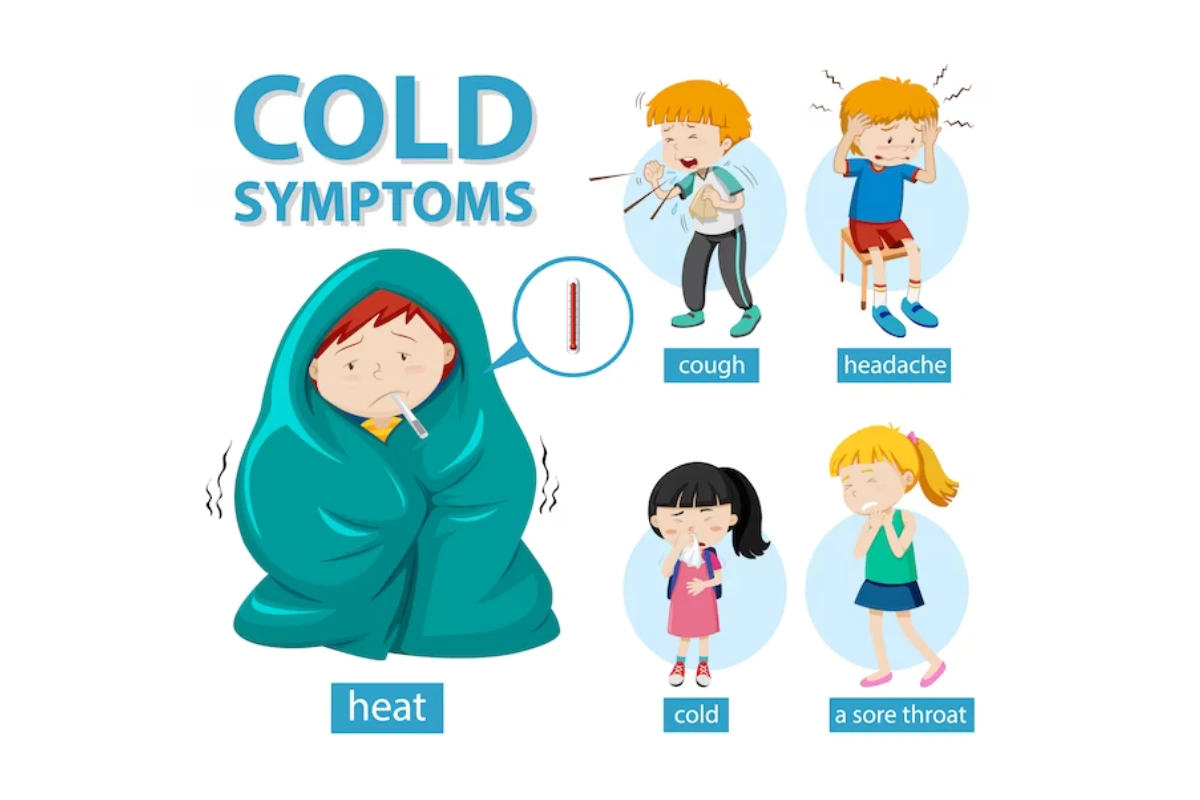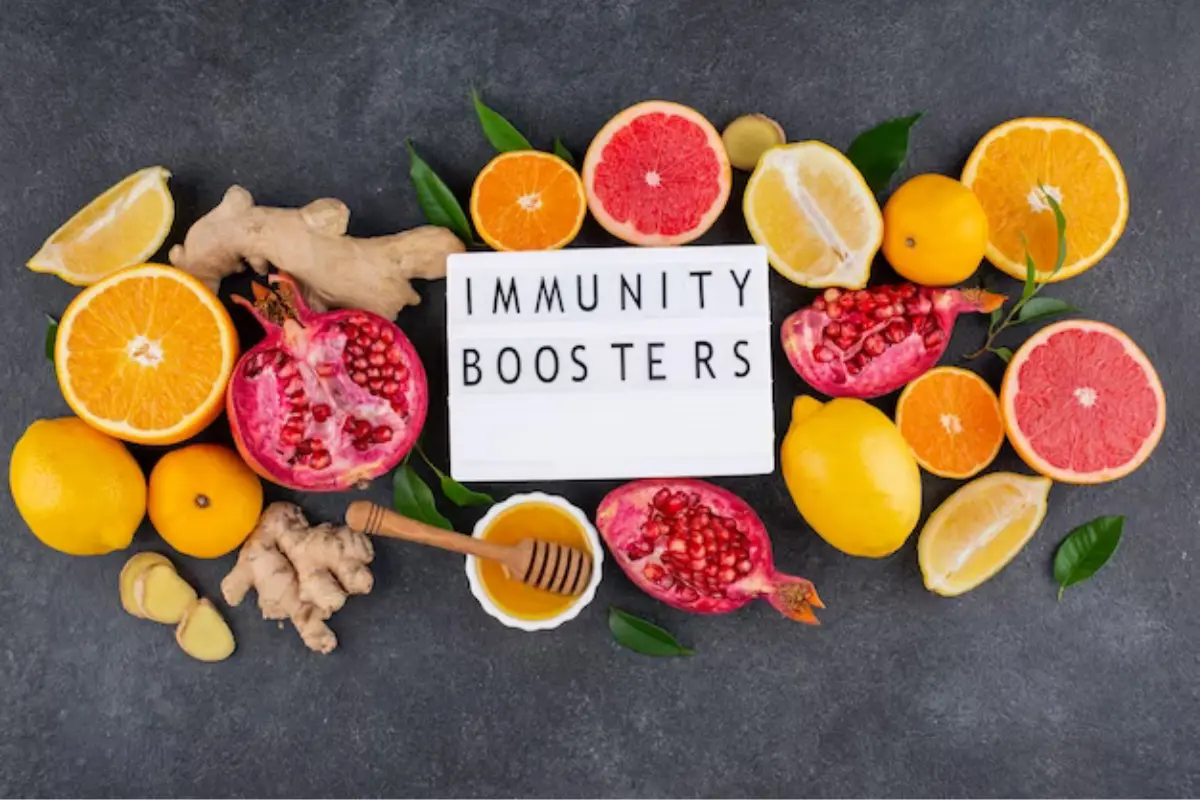Introduction
Winter is a period of year when its gets chilly and people get sick from common cold. However, there are foods that we can eat to keep our bodies healthy and prevent illness. These things resemble covert aides. We will discover the identities of three of these covert aides in this tale. Similar to specific nutrients, they help to build up our bodies’ resistance to the common cold. In order to keep healthy throughout the colder months, let’s embark on a trip to uncover the “Secret Nutrients to Keep You Safe from the Common Cold This Winter!”

Understanding the Common Cold
What is the common cold, its symptoms, and causes
The common cold is one of the most popular diseases existing worldwide. It’s an infection that originates from the viruses affecting the nose and the throat. In this case, we look into the nature of the common cold, its symptoms and the factors that cause it.
What is the Common Cold?
Cold or otherwise known as the common cold is an upper respiratory tract infection caused by a virus.” One of the most common illnesses with human. Rhinoviruses are the most common culprit viruses for the cold.
Symptoms of the Common Cold
Although the symptoms of a cold might differ from person to person, they often consist of:
- Runny or Stuffy Nose: Runny or blocked noses are among the most prevalent symptoms of having a cold.
- Sneezing: This common symptom is usually a case of frequent sneezing.
- Coughing: Mucus producing or dry cough characterizes a cold.
- Sore Throat: This usually leads to a sore, dry, and itchy throat or a scratchy or painful one.
- Watery Eyes: Occasionally some individuals may get a runny nose and irritation in their eyes.
- Mild Headache: They usually result in headaches that mostly emanate from sinus congestions.
- Fatigue: Such cold symptoms may make one feel tired and generally unwell.
- Low-Grade Fever: Though sometimes you could have minor fever, this is not always the case when having a cold.
- Mild Body Aches: In this case you may see a mild pain in muscles.
Cold viruses, especially rhinovirus is considered one of the main reasons for the development of this disease. These viruses can be transmitted by the following and are very contagious:

Causes of the Common Cold
Airborne Transmission: The person who has a cold sneezing and coughing releases viral minute droplets that get suspended in the air easily. The droplets may infect your body when you breathe into them.
Direct Contact: Cold virus may be deposited on objects like surfaces which in return can end up touching the individual’s mouth, eye, and nose subsequently resulting into infection.
Close Contact: The transmission of a cold virus is possible even when two people are very near each other and perhaps shake some hands or give a hug.
Contaminated Objects: For instance, cold viruses might live for several minutes on certain surfaces. You can also get infected if you touch a contaminated surface and then your face.
The Importance of Staying Healthy During the Cold Season
Winter brings colder temperatures that make us feel less healthy. However, it is extremely crucial that we should stay well during this period. Let’s examine this more closely to see why it matters:
1. Avoid Getting Sick
Many people are prone to catching infections such as a cold, influenza, and other ailments during winter. This can really give you a terrible feeling. However, if one is in order with health measures, you will hardly fall ill.
2. Enjoy Winter Fun
The winter as a period rich in entertainments: games in snow, skiing, etc., festivity celebration. However, if you are fit, you will not feel so tired or sick to prevent you from joining these activities.
3. Keep Your Energy Up
It is not that uncommon to get sick when the weather turns cold as this results in sluggishness similar to that felt when one wants to roll around in bed all winter long. However, one feels energized and rejuvenated when he is well. There’ll never be any times when you’re too lazy and/or just sleepy.
4. Stay in a Good Mood
It is not only about being healthy for your body, but also for your mindset. One could also experience anger, sadness, and grumpiness when unwell. However, if you are well, then your moods will be much positive, and you’ll have more fun during the autumn.
5. Don’t Miss School or Work
You can get sick and this can make you fail to attend either school or workplace. That is a problem and that can really hurt because you will have to study some more in the future However, it is possible for well-being people to attend school or work daily without falling back.
6. Protect Your Loved Ones
It won’t be only about health maintenance in cold season, but also for those around you. It’s also ensuring safety of your loved ones (family and friends) If healthy, then sickness will not spread onto them.
How can one stay healthy during the winter? In order to be taken care of you need to watch your diet properly, dress warmly, and wash your hands regularly. Moreover, a person can be given a flu vaccine as another way of reducing their chances of falling sick. Remember that healthy people take chilly times as easier and more enjoyable.
The prevalence of colds during winter
During the wintry weather season, the prevalence of colds has a tendency to boom. This is due to the fact people spend extra time indoors, in proximity to others, which allows the spread of viruses. Additionally, the chillier temperatures and decrease humidity can dry out our nasal passages, making it easier for viruses to enter our bodies. Furthermore, our immune systems may be weakened at some point of this time due to factors including stress, loss of sleep, and terrible vitamins.
All of those factors make contributions to the better incidence of colds in the course of the iciness season. It’s vital to take preventive measures along with washing fingers frequently, staying hydrated, and keeping a wholesome life-style to reduce the hazard of catching a cold. By being mindful of our fitness and taking proactive steps, we will help guard ourselves at some stage in the winter months.
The Power of Nutrients
Explaining the role of nutrients in supporting the immune system
Think about nutrients as your body’s natural superhero team. Just like a well-trained squadron of superheroes needs their respective special powers to take down the villain, your body requires a variety of nutrients to defeat illnesses, such as the common cold.
Nutrients: whether they’re vitamins, minerals, or proteins—work in synergy to power up your immune system. They facilitate the production of white blood cells, antibodies, and other soldiers that fight off foreign invaders. They also repair and build new cells because, let’s be honest, no war is won without a bit of reconstruction in the aftermath, right?

Introduction to the secret nutrients that help shield against the common cold
Here’s where it gets interesting—I’m diving deep into some undercover nutrition intel. There are certain secret agents—err, nutrients—that wield oodles of power in the battle against the common cold. We’re unmasking these heroes, so we can load up our nutritional arsenal this winter.
Vitamin C: The Immunity Booster
Detailed information about Vitamin C and its immune-boosting properties
Prepping for the flu season without Vitamin C is akin to Batman without his Batmobile. That’s right! Vitamin C, also known by its less glamorous name ascorbic acid, is notorious for its immune-boosting properties. This powerful vitamin encourages the production of white blood cells (think of these as your body’s bouncers), which are key to fighting off infections.

Sources of Vitamin C-rich foods
A Vitamin C shortage in the midst of winter is a no-no. So, grab a glass and let’s fill it with orange juice! Vitamin C is abundant in citrus fruits, such as lemons, oranges, and grapefruits. But don’t stop there. Strawberries, bell peppers, sprouts, and tomatoes are also excellent sources of this super vitamin. Remember, variety is the spice of life—even in nutrition!
Vitamin D: The Sunshine Vitamin
Exploring the role of Vitamin D in strengthening immunity
Meet Vitamin D—often hailed as the Sunshine Vitamin. Although receiving its spotlight for its role in bone health, Vitamin D is also a key player in immunity. This underrated nutrient can trigger the body’s T Cells, the immune system’s silent assassins, to combat bacteria and viruses lurking in the shadows.
Discussing how to get enough Vitamin D during the winter
Winter might mean less sun, but it doesn’t have to mean less Vitamin D. Foods like fatty fish (say salmon and mackerel), cheese, egg yolks, and fortified dairy, cereals and orange juice can help keep your Vitamin D levels in check. Who said you can’t create your own sunshine, eh?
Zinc: The Cold Crusher
Highlighting the importance of zinc in fighting off the common cold
Channel the mightiness of Thor’s hammer with zinc—your cold crusher! This powerhouse mineral is critical for immune function and has been linked to reducing the duration of cold symptoms.
Food sources that are rich in zinc
There’s a grand buffet of zinc-rich foods out there to add that extra punch to your plates. Oysters are particularly rich in zinc, but other shellfish like crabs and lobsters can help too. For those preferring their nutrients landlocked, reach for red meat, poultry, chickpeas, lentils, and seeds.

Iron The Energy Enhancer
Explaining the connection between iron and a strong immune system
Ever wondered what the soon-to-be Iron Man Tony Stark ate for breakfast? Probably something rich in iron! Just like good ol’ Tony needed his Iron Man suit to save the world, our bodies need iron to power up the immune system, carry the oxygen our cells need to fight off infections, and keep our energy levels soaring.
Discussing iron-rich foods and their importance
While Popeye might have downed spinach to boost his might, for a hefty dose of iron, you can go beyond the leafy greens. Red meat, poultry, and fish are all iron-hearty, and let’s not forget our plant-based warriors—lentils, beans, and fortified cereals.
Nutrient-Rich Winter Foods
Listing foods that are packed with the mentioned nutrients
Now that we know our superheroes, let’s put them on the plate! Winter is a treasure trove of nutrient-rich foods. Think citrus fruits, leafy greens like spinach and kale, calciferous veggies like broccoli and Brussels sprouts, not to forget, the good-old poultry, and seafood!
Offering tips on incorporating these foods into a winter diet
Balancing all these nutrient superheroes in your diet may seem like trying to watch a movie in a chaotic, super villain-infested city. But don’t stress—it is simpler than it sounds. Create a rainbow on your plate with colorful fruits and veggies, add lean protein, toss in some whole grains, sprinkle a dash of dry fruits or seeds, and voila—you’ve got a power-packed diet.
Supplements and Winter Wellness
Discussing the use of supplements to bridge nutrient gaps
If you’re struggling to meet the nutrient thresholds through food alone, supplements can be your superhero sidekicks. They aid in filling those nutritional gaps that might be difficult to achieve through diet alone, ensuring that your immune system remains rock-solid.
The importance of consulting with a healthcare professional
Keep in mind, though, before you venture into the supplement universe, always discuss with your healthcare provider. After all, they are the Alfred to your Batman—always there to guide you in the most tricky of situations!
Lifestyle Factors for Cold Prevention
Tips on maintaining a healthy lifestyle during the winter
Of course, nutrition is your superhero, but even superheroes need support. Regular exercise, adequate sleep, proper hydration—all these can give an extra boost to your immunity, making you a formidable foe to the common cold.
Hygiene practices and cold prevention strategies
Never underestimate the power of good hygiene in your quest for wellness. Frequent hand-washing, avoiding close contact with sick people, and not touching your face can act as your metaphorical “spidey sense” against cold-causing bugs.
Common Cold: Secret Nutrients to Shield You from This Winter Vedio tutorial for you:
https://youtu.be/6SXw9AWjLQo?si=NBpBzOGpbMbQw9IX
Conclusion
So there you have it, folks! Nutrient superstars Vitamin C, Vitamin D, Zinc, Iron all together in your mission against the common cold. Whether you choose to swing with them through the bustle of your everyday diet or summon them through the capsules of supplements, remember, your nutritional superhero team is the key to shield you this winter.
Remember, “with great power, comes great responsibility”, so unleash the superhero in you this winter by powering up with these secret nutrients.
FAQs
What foods help cure a cold?
One can get relief with chicken soup, citrus fruits, ginger, honey, garlic, hot tea and muesli at a cold. Even though they cannot cure it, they can reduce the symptoms and help you recover. One should also rest and hydrate frequently.
What nutrients prevent colds?
Some nutrients, such as, Vitamin C, Vitamin D, Zinc, and Iron could support your immune system towards fighting against cold viruses that prevent complete protection against colds. These vitamins are essential in reducing the cases of severe colds if they had been taken during balanced nutrition.
How can I boost my immune system against a cold?
To boost your immune system against a cold: Eat a balanced diet. Stay hydrated. Get enough sleep. Manage stress. Exercise regularly. Wash your hands. Avoid smoking and excessive alcohol. Consider supplements if needed.
What are the 5 stages of cold?
The five stages of a cold are Incubation, Prodromal, Symptomatic, Recovery, and Post-Cold.
